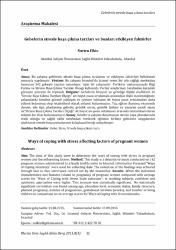| dc.contributor.author | Elkin, Nurten | |
| dc.date.accessioned | 2019-01-31T14:13:32Z | |
| dc.date.available | 2019-01-31T14:13:32Z | |
| dc.date.issued | 2015-11-17 | |
| dc.identifier.issn | 1308-0830 | |
| dc.identifier.uri | http://hdl.handle.net/11363/1081 | |
| dc.description.abstract | Amaç: Bu çalışma gebelerin stresle başa çıkma tarzlarını ve etkileyen faktörleri belirlemek amacıyla yapılmıştır. Yöntem: Bu çalışma İstanbul’da hizmet veren bir aile sağlığı merkezine başvuran 142 gebeyle yapılan tanımlayıcı tipte bir çalışmadır. Verilerin toplanmasında Bilgi Formu ve Stresle Başa Çıkma Tarzları Ölçeği kullanıldı. Veriler araştırmacı tarafından karşılıklı görüşme yöntemi ile toplandı. Bulgular: Gebelerin bireysel ve gebeliğe ilişkin özellikleri ile “Stresle Başa Çıkma Tarzları Ölçeği” alt boyut puan ortalaması arasındaki ilişki incelendiğinde; çalışanlarda kendine güvenli yaklaşım ve iyimser yaklaşım alt boyut puan ortalamaları daha yüksek bulunmuş olup istatistiksel olarak anlamlı bulunmuştur. Yaş, eğitim durumu, ekonomik durum, aile tipi, planlanmış gebelik, gebelik sayısı, gebelik haftası ve yaşayan çocuk sayısı ile“Stresle Başa Çıkma Tarzları Ölçeği” alt boyutları puan ortalaması arasında istatistiksel olarak anlamlı bir ilişki bulunmamıştır. Sonuç: Gebelerin çalışma durumunun stresle başa çıkmalarında etkili olduğu ve sağlık ekibi tarafından verilecek eğitimle birlikte gebelerin kaygılarının azaltılarak stresle başa çıkmalarının kolaylaşabileceği anlaşılmıştır. | en_US |
| dc.description.abstract | Aim: The aims of this study were to determine the ways of coping with stress in pregnant women and the influencing factors. Method: This study is a descriptive study conducted on 142 pregnant women administered to a family health center in Istanbul. Information Formand “Ways of Coping Inventory” were used for collecting data. The collection of the findings was achieved through face to face interviews carried out by the researcher. Results: When the individual characteristics and features related to pregnancy of pregnant women compared with average scores for “Ways of Coping with Stress Scale subscales”; in working subjects, confident and optimistic approaches were higher. This increase was statistically significant. No statistically significant correlation was found among age, education level, economic status, family structure, planned pregnancy, number of pregnancies, gestational duration (weeks), and number of living children in comparison to the average scores for Ways of Coping with Stresssubscales. Conclusion: In this study, it was realized that the working conditions of pregnant was effective to cope with stress. Anxiety of pregnant women can be reduced by the training to be provided by health professionals, making it easier to cope with pregnancy related stress | en_US |
| dc.language.iso | tur | en_US |
| dc.publisher | Mersin Universitesi | en_US |
| dc.rights | info:eu-repo/semantics/openAccess | en_US |
| dc.rights | Attribution-NonCommercial-NoDerivs 3.0 United States | * |
| dc.rights.uri | http://creativecommons.org/licenses/by-nc-nd/3.0/us/ | * |
| dc.subject | Research Subject Categories::SOCIAL SCIENCES | en_US |
| dc.title | Gebelerin Stresle Başa Çıkma Tarzları ve Bunları Etkileyen Faktörler | en_US |
| dc.title.alternative | Ways of Coping With Stress Affecting Factors of Pregnant Women | en_US |
| dc.type | article | en_US |
| dc.relation.ispartof | Mersin Üniversitesi Sağlık Bilimleri Dergisi | en_US |
| dc.department | İstanbul Gelişim Üniversitesi | en_US |
| dc.identifier.volume | 8 | en_US |
| dc.identifier.issue | 1 | en_US |
| dc.identifier.startpage | 22 | en_US |
| dc.identifier.endpage | 31 | en_US |
| dc.relation.publicationcategory | Kategori Yok | en_US |



















